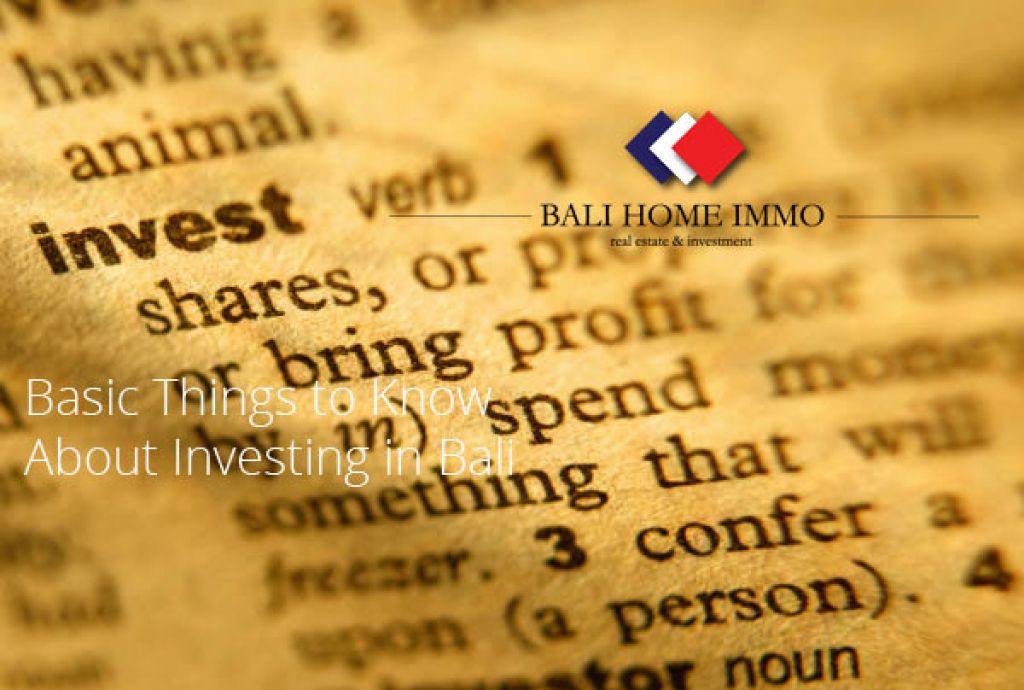Basic Things to Know About Investing in Bali

Ok. You have the money and you’ve been thinking about investing in Bali. What you need now is good advice on what kind of investment you should make. Since we're a real estate and construction company, it’s clear that you’re looking to invest in this area right? Because, otherwise, you won’t be here.
Here are some relevant questions to consider before you make an investment in Bali.
Freehold or leasehold?
This question never gets old. If this question is still bugging you, let me make it clear for you: no foreigner can own a freehold property in Bali using his/her name as the titleholder. Indonesian law simply doesn’t permit it, and for good reason. Otherwise, it could be colonial days all over again.
“If that is so, how come a friend of a friend managed to get a freehold certificate for his property?” The answer to that question is this: most likely, he has an Indonesian nominee who acts as the property title holder on his behalf. This nominee could be anyone as long as he or she is an Indonesian citizen. It could be his spouse, for example, or someone he can trust (sponsor, your ex’s Indonesian husband etc). Hell, I even know people who use his gardener or driver as the titleholder. However, as you can guess already, this is a risky move. You’ve probably heard about the sob story of a guy who loses his property due to trusting the wrong person for such an arrangement. Take notes, because that story is probably true.
As risky as it may be, many still insist on doing it. Indeed, a watertight pre-agreement could avoid such disaster by closing loopholes that could create problems in the future. However, when it goes wrong, it goes wrong, and unless you come prepared, a turbulence ride awaits.
Secondly, that person may acquire his property using his company’s name. This is also possible as long your company fulfills all requirements to acquire property (as the company’s assets). We call this the PMA method. FYI, PMA is an acronym for Penanaman Modal Asing (Foreign Investment Company) and it refers to the company you own. The setback of this method is that it takes time and money to set up a company here.
To build or not to build?
If you’re a builder and you know your way about planning, budgeting, men management and all that stuff, go for it. Outsource everything else. Familiarize yourself with assortments of building materials available in Bali. Learn the regulations, visit building expos, ask around, find a first mate, someone you trust that could build for you. If you decide to build, the workforce is another thing you have to plan out thoroughly, especially in terms of labor supply, management and communication (that can be tricky sometimes, due to language barrier).
Without proper knowledge, even if you’re a builder back home, things can be out of hand really fast, from delays to bad finishing.
That’s one.
Number two, if you decide to invest in a resale villa or other type of property instead, make sure that everything is legit and it has a building permit (IMB). Conduct due diligence properly. It may be necessary to consult with a notary public or company that specializes in this kind of service before you make any decision.
Where to Invest?
Like in your home country, some areas in Bali cost more than the others, but at the same time also promise greater ROI: a simple demand and supply thing. On the other hand, a place can lack what is necessary to give high yields, but the cost is twice or three times cheaper and the view is amazing, so it’s worth it. It’s important to calculate everything before making an offer. Whatever place you choose, make sure it fits your needs. A place in Seminyak or Petitenget may be perfect to be developed into a daily or short term rentals, but consider the noise coming from nearby bars and clubs. Investing that large amount of money only to be sorry after is not good at all, is it? Look for the plus factor of the area. Is it the view? Is there any development that will add value (or the contrary) to the area in the near future? Gather as much information in this phase. Compare notes with friends or acquaintances that are familiar with the area if necessary.
In this case, the North Kuta area (especially Berawa, Echo Beach, and Pererenan) is still one of the top most-sought-after areas for residential and commercial purposes. The area still continues to develop, with some challenges in the communication sector, especially in fiber optics grids coverage and unstable mobile signal reception. Other than that, residential and commercial incentives (schools, food and beverage, sunny beaches) along with the availability of basic infrastructures will continue to draw investors in years to come.
What about the cost?
Ok. You’ve found the answers to the questions above. Now it’s time to sum everything up and convert it all into numbers. What numbers are we talking about here?
Keep in mind that as far as the price is concerned, there are no clear guidelines. The price for land and villas changes on a regular basis in Bali. Pure speculation, property resale or simple greed drive such fluctuation. The government doesn’t regulate property prices. They leave it at the mercy of the seller. Whatever that may be, always remember, that everything is negotiable here in Bali. Negotiate the price as if your life depends on it!
Here I summarize quick and dirty tips to consider before making an offer:
- Stick to your budget.
- Unless you’re Richard Branson or Warren Buffet, don’t fall into stereotypical “bule” acting like he owns all the money to buy this world. Be humble and friendly with your middleman (known as makelar) or property agent and of course, the seller. Those two simple things will make your life 100x easier in the negotiating process.
- Negotiate, negotiate, negotiate!
There. I think this post has covered all the basics you need to know about investing in Bali. What do you think? You can share your experience or question in the comment below. For more detailed information, feel free to email us or drop a visit to our office.




